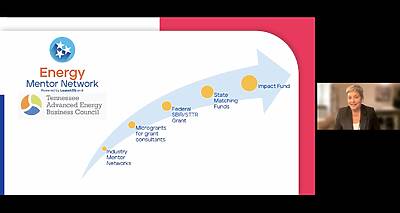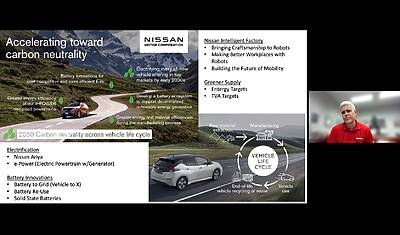Stakeholders from government agencies, higher education, and the private sector emphasized the value of the state’s advanced energy economy and opportunities for future development and collaboration
The Tennessee Advanced Energy Business Council (TAEBC) hosted its second Advanced Energy Virtual Business Roundtable, this time focused on Middle Tennessee stakeholders. The event brought together 10 speakers representing three main areas of the state’s advanced energy (AE) economy: government agencies, higher education, and the private sector.
Government Agencies
David Salyers, Commissioner of the Tennessee Department of Environment and Conservation (TDEC), kicked off the event by speaking about the value of EV adoption for the environment and economy, along with the TN Corridor Fast Charging Network, a new partnership between TDEC and the Tennessee Valley Authority (TVA).
“We strongly support the goal of becoming the number one state in the country for the EV supply chain,” said Salyers. “We are committed to providing a cleaner, safer environment, and are supportive of more efficient modes of transportation that can reduce emissions, improve air quality, decrease transportation-related energy costs, and drive economic plus job growth across our state.”
Representing the federal perspective, Chris Berryman, Senior Target Market Specialist at TVA, discussed the wide-reaching economic impacts EVs can have on the state’s economy from the EV manufacturing project to the supply chain. He also discussed the effects of EVs on the utility sector and on TVA in particular.
“TVA, along with its State Economic Development Partners, are currently working on approximately $25 billion of new EV manufacturing projects,” said Berryman. “These projects are considering the TVA’s seven-state region along with other competing States in the Southeastern U.S. This equates to a potential job creation of approximately 35,000 new jobs.”
Next, Van Tucker, Chief Executive Officer of Launch Tennessee, spoke about the organization’s many network partners, including the statewide entrepreneur centers and the Energy Mentor Network, run by TAEBC in partnership with LaunchTN. She also provided an update about the restoration of State Matching Funds for federal SBIR/STTR grant recipients across the state.
 “Those funds are important because federal funds are restricted as to how those dollars can be spent,” said Tucker. “The State Matching Funds are unrestricted and can be used for things like hiring a business development officer, launching a website, or even hiring an attorney to secure your IP. As a company, you’re able to use those funds that really help grow and scale a business.”
“Those funds are important because federal funds are restricted as to how those dollars can be spent,” said Tucker. “The State Matching Funds are unrestricted and can be used for things like hiring a business development officer, launching a website, or even hiring an attorney to secure your IP. As a company, you’re able to use those funds that really help grow and scale a business.”
Wrapping up the government agency portion of presentations, Victoria Hirschberg, Director of Business Development at Tennessee Department of Economic and Community Development (TNECD), spoke about TNECD’s mission to make the state a leader in the EV supply chain and referred to the sector as a “very fluid and active.”
“There is a lot going on in our state and I’m really proud to be part of it,” said Hirschberg. “I think as we continue to build out this network and talk to companies that are interested in doing business, having meetings like this is so important.”
Higher Education
Both Flora Tydings, Chancellor of Tennessee Board of Regents (TBR), and Claude Pressnell, President of Tennessee Independent Colleges and Universities Association (TICUA), returned for the second Business Roundtable to discuss higher education’s role in the AE sector.
Tydings provided an overview of TBR’s mission, AE programming, and how TBR received an additional $80 million from the state’s budget to increase what the system is doing with technical education, reduce the technical education waitlist, and look directly at what they are doing in the AE sector.
“We are always looking toward the economic development of our state,” said Tydings. “We are dedicated to making sure we place students. Right now, our rate for placement is at 89 percent. So, if you graduate from one of our programs, 89 percent of our students have received a job immediately after graduation in their field of study.”
Following Tydings’ presentation, Pressnell gave an overview of TICUA campuses and students, various public-private partnerships across the state, and engineering programs that were created to specifically meet the needs of local employers.
“The focus on science, the focus on technology is pretty critical to us. We rely very heavily upon corporate advisory committees to be able to shape our curriculum so that we can meet the needs of local and statewide employers,” said Pressnell. “We are very responsive to the corporate needs in the area.”
Private Sector
Moving into the private sector portion of the webinar, Jim DeMouy, Vice President of Environment, Health, Safety and Sustainability at Bridgestone Americas and TAEBC Board Member, highlighted Bridgestone’s environmental mission and key milestones, along with renewable energy goals for its operations, products and technologies. DeMouy also highlighted two of the company’s environmental milestones it is set to reach by 2030.
 “One is to increase the recycled and renewable content of our products to 40% by 2030,” said DeMouy. “The second was to move to an absolute emissions reduction, which again goes to the energy discussions we’re having here, by 50 percent by 2030.”
“One is to increase the recycled and renewable content of our products to 40% by 2030,” said DeMouy. “The second was to move to an absolute emissions reduction, which again goes to the energy discussions we’re having here, by 50 percent by 2030.”
Finally, two representations from Nissan Group of Americas closed the presentation portion of the event. Chris Goddard, Manager of Energy and Environmental, and Mike Clemmer, Director of Corporate & Manufacturing Facilities and Environmental, presented about Nissan’s efforts to accelerate toward carbon neutrality and electrification, including EVs, battery innovations, intelligent factories, and a greener energy supply.
“Like a lot of companies, earlier this year, globally, we made the announcement to be carbon neutral by 2050. If you look at just Tennessee operations, we have improved our efficiency by close to 40 percent,” said Goddard. “And we’re very excited about the electrification of our fleet.”
Following presentations, speakers answered a range of audience questions on building up the infrastructure of the state’s AE economy, EV supply chain efforts, private-public partnership, workforce development, and recent electrification updates across the state.
“It was really exciting to join TVA earlier this year by trying to remove some of the barriers to adoption,” said Commissioner Salyers about the launch of the TN Corridor Fast Charging Network and future EV initiatives.
Loved the event? Missed it? Sign up for our newsletter to learn more about our members, advanced energy news and upcoming events. Also, if you’re not already a member, become a member today!
